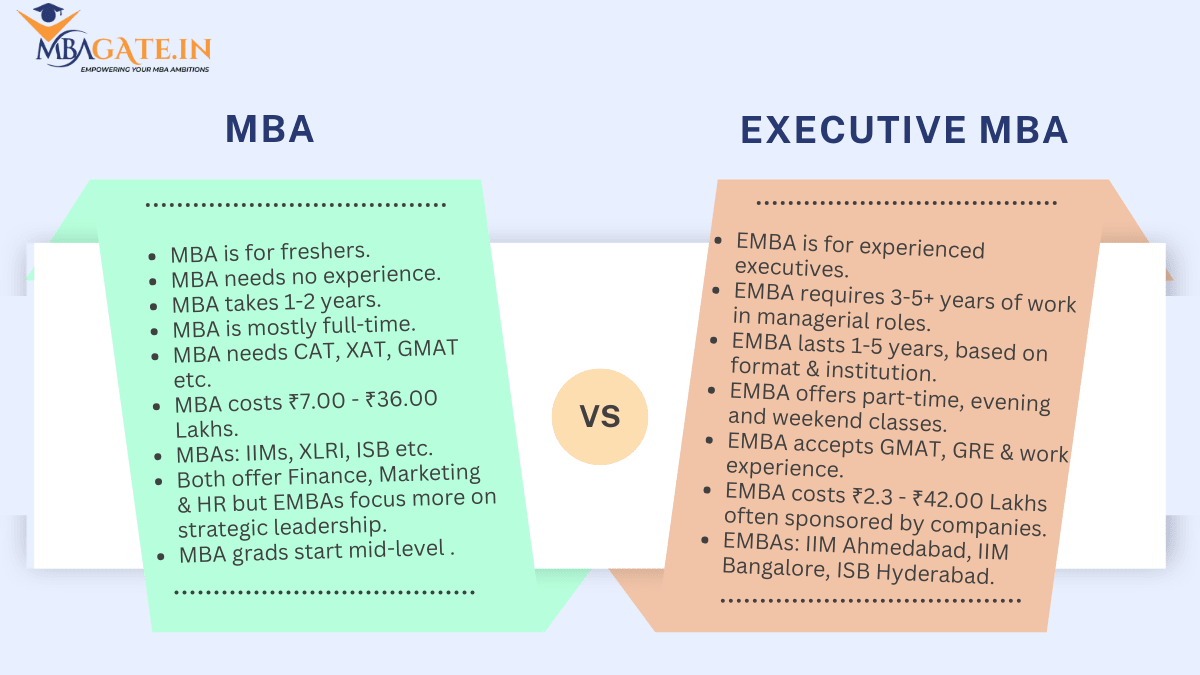MBA vs Executive MBA
What is an MBA?
A Master of Business Administration popularly known as an MBA program is a graduate-level degree. MBA means to develop the skills and knowledge required by the candidates in business and management. This program builds a strong base for the candidate in areas like finance, marketing, human resources, operations and leadership. An MBA program has coursework, case studies, group projects and practicals that prepare students for a range of business management roles in various industries.
The MBA program is for candidates who want to make their careers in business management, move to new fields or even start their own businesses. Depending on the schedule the students can either pursue a full-time MBA regular program or a part-time one. MBA is widely recognised as a degree that can enhance the career prospects of the candidate, increase their potential and provide different opportunities for networking and personal growth.
Candidates with a minimum of 50% mark in their graduation in any field are eligible for the regular MBA program. Some of the top colleges, like the IIMs, may need higher scores and a CAT percentile of 80% or above. Other colleges can accept the scores of XAT, GMAT or CAT exams with graduation marks ranging between 50% and 55%.
The candidates can take admission into the IIMs and the other top business schools in India through the popular entrance exams such as CAT, XAT, GMAT, SNAP, NMAT, MAT etc. It is then followed by group discussions, written ability tests and personal interviews. Some of the top MBA colleges in India include IIMs, XLRI, FMS, IITs and ISB with fees ranging from ₹2.00 Lakhs to ₹45.00 Lakhs. Popular specialisations of the MBA program in India include HR, marketing, finance, sales and operations.
What is Executive MBA?
Executive MBA program is popularly known as the MBA for working professionals. The Executive MBA can also be written as EMBA. An Executive MBA is the curriculum specially designed for working professionals.It includes part-time, evening/weekend classes and also a full-time Executive MBA program. The program makes it easier for working professionals to handle their work commitments and their studies efficiently.
The individuals who want to pursue the Executive Management Program should have a graduation degree in any field along with three to five years of work experience. (The job experience required for admission into the EMBA may vary based on the institution or college.) The best executive MBA programs include operations, marketing and sales, human resources and finance.
The aspirants who want admission into the EMBA program can take the national, state or university-level entrance exams. Some of the common entrance exams are GMAT, GRE, CAT, CMAT, SANP, XAT and NMAT. The Executive MBA duration is 1–5 years, depending on which mode of EMBA course the candidate chooses. The Executive MBA Programme is offered by the prestigious IIMs along with other top B-schools such as FMS Delhi, XLRI Jamshedpur, Symbiosis Institute of Business Management Pune, Jamia Millia Islamia etc. Depending on the institution, the fees for the EMBA course are higher than the regular MBA program and range from ₹2.32 Lakhs to ₹42.00 Lakhs. The organisation in most cases fully funds their employee's EMBA. The average Executive MBA salary ranges from ₹10.00 to ₹55.00 Lakhs per annum. After the Executive MBA program is completed professionals can move into senior leadership roles such as communication manager, HR director, brand manager, vice president or quality control manager.

Difference Between MBA and Executive MBA
MBA (Master of Business Administration) and Executive MBA (EMBA) are two sought-after business courses but cater to different sorts of students. MBA is best for fresh graduates or young career professionals whereas an EMBA is meant for experienced working professionals wishing to advance in their professional careers without quitting their present jobs. They vary in length, eligibility, format, charges and career prospect. Given below is a detailed comparison between an EMBA vs MBA covering multiple aspects:

Top 15 MBA Colleges in India
In India, there are some of the well-known MBA colleges that provide world-class business education. These colleges provide a range of specialised MBA programs with competitive entrance exams like CAT, XAT, GMAT and SNAP for admission.
The top 15 MBA colleges in India like IIM Ahmedabad, IIM Bangalore, ISB and XLRI are known for their tough curriculum, experienced faculty and strong industry connections, thereby making sure of high average salary packages for their graduates. The fees for these programs vary from college to college. Given below are the top 10 MBA colleges in India along with the entrance exam accepted, their duration, average package and fees:
Top 10 Executive MBA Programs and Colleges in India
Some of the top B-schools like ISB and IIMs offer this course along with strong industry connections, good salary packages for graduates and opportunities to be hired by leading global and national companies. Given below are the top Executive MBA programs and colleges in India including average salary packages and prominent recruiters related to each institution:
| College Name | Name of the best Executive MBA programs | Entrance Exam Accepted | Duration | Fees | Average Salary |
| IIM Ahmedabad | PGPX | GMAT/GRE | 1 Year |
| ₹54.8 Lakhs per annum |
| IIM Bangalore | EPGP/EMBA | GMAT/GRE | 1 Year |
| ₹33.07 Lakhs per annum |
| IIM Calcutta | MBAEx | GMAT | 1 Year | ₹31.00 Lakhs | ₹30.90 Lakhs per annum |
| IIM Lucknow | IPMX | GMAT/GRE | 1 Year | ₹26.00 Lakhs | ₹34.00 Lakhs per annum |
| IIM Indore | EPGP | GMAT/GRE/CAT | 1 Year | ₹22.12 Lakhs | ₹25.68 Lakhs per annum |
| ISB Hyderabad | PGPMAX | Online Application | 15 Months | ₹49.50 Lakhs | - |
| IIM Kozhikode | EMBA | GMAT/GRE/EMAT | 2 Years |
| ₹22.00 Lakhs per annum |
FAQs
The path that leads towards attaining an MBA degree can be challenging but it is possible. The challenge depends on several factors including the academic background, career goals, attitude and preparation. The coursework of an MBA is quite exhausting as it includes homework, case studies and tests. It also places emphasis on finance, marketing and leadership-related subjects. The course taught you skills like decision-making and teamwork. Finding the right balance between studies and work sometimes can be challenging but using an effective time management strategy and commitment, everything will become possible.
The EMBA program has not set any age limit for admission as a criterion. It only depends on the personal choices and circumstances of the aspirant. People do MBAs at different points in their careers and they succeed.
India as a country has many executive MBA colleges, but the top five colleges for the EMBA program are IIM Ahmedabad, IIM Calcutta, IIM Bangalore, IIM Indore, IIM Lucknow and ISB Hyderabad.
For working professionals such as a chief financial officer, business owner or manager pursuing an executive MBA is a sensible choice. Nevertheless, if you are not experienced a typical MBA is the right option.








